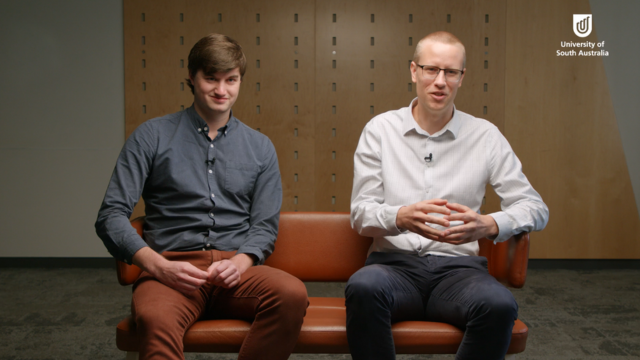Bachelor of Arts (Applied Linguistics)
Degree Level Undergraduate
Year 2025
You're considered an Australian student if you are any of the following:
Degree Level Undergraduate
Year 2025
Entry Scores
2025 Guaranteed Entry
Year 12 (ATAR-based): 65.00
Year 12 (Grades-based): B,B,C
TAFE/RTO: DIP
View Guaranteed Entry Info
2024 Cut-Offs
Year 12 (ATAR-based):
- Internal: 65.00
TAFE/RTO: Cert IV
View full entry requirements
The admission criteria have been grouped to assist you to easily find the information most relevant to your circumstances. However, you may fit into more than one and the university will consider applicants against each of the relevant criteria.
Certain conditions apply. For more information refer to Appendix 4 of the University's Selection and Entry policy.
Applicants are required to meet one of the following criteria with a competitive result, and demonstrate that they fulfil any prerequisite requirements and essential requirements for admission:
Recent secondary education
Meet any prerequisite requirements with a minimum grade of C- or equivalent
AND
Applicants who have not achieved the Selection Rank required for automatic selection may be selected for any remaining places based on the grades of their year 12 subjects.
OR
Higher education study
OR
Vocational Education and Training (VET)
OR
Work and life experience
12018 Excellence in Research for Australia (ERA). 2Ranked equal #6 ComparED (QILT) Graduate Outcomes Survey 2021-23, Humanities, Culture and Social Sciences – Full-time Employment Indicator (Domestic Postgraduate). SA public universities 32024 Good Universities Guide – Undergraduate.

As a student studying the Applied Linguistics major you will gain an in-depth understanding of human language and learn how language shapes human experience, through the integration of theoretical and applied perspectives, with a strong practical, community and industry focus.
You will:
You will also graduate with writing, presentation, digital, communication, research and problem-solving skills that can be transferable across a range of roles and are highly regarded by prospective employers.
Learn more about how to tailor your Arts degree to suit your interests in the Humanities and Social Sciences.
If you finish your degree with a credit or higher-Grade Point Average (GPA), you could also be eligible for the one-year Bachelor of Arts (Honours) degree.

Under the guidance of world-class researchers1 you will embark on an in-depth study of the nature of human language. You will develop in-depth knowledge in your chosen specialisations, enhancing your critical thinking, research capabilities and problem-solving skills. You will also graduate with writing, presentation, digital, and communication skills that can be transferred across a range of roles and are highly regarded by prospective employers. You will focus on:
This degree allows you to select two majors ensuring you graduate with a broad knowledge of two areas of interest. You can choose your second major from the following:
You will also be required to complete two core courses, four courses from a selected list of minors (also from the above list), and Professional Directions Program 1 & 2 or two electives.
12018 Excellence in Research for Australia (ERA)
You can gain an extra qualification and broaden your career prospects by completing a Diploma in Languages.

This degree increases your employment prospects by enabling you to gain expertise in two different areas of interest. Applied Linguistics is increasingly recognised as important for emergent areas of employment and technology. You will learn from world-class educators and researchers in linguistics1 and benefit from our state-of-the-art learning facilities.
You will have opportunities to engage with community and industry partners through placements and mentoring conversations as part of your studies through the Professional Directions Program.
There are also opportunities to study a portion of your degree overseas, as part of the Global Experience study tours.
You could continue your studies with a Master of Teaching with one major and one minor learning area. If this interests you, please read How Do I Become a Teacher before selecting your courses.
UniSA’s Bachelor of Arts is taught by world-class educators and researchers and enables you to pursue two areas of academic interest at once. Hear from UniSA student Luke Heathorn and Program Support Coordinator Louis Everuss on what it's like studying our Bachelor of Arts degrees.

Your knowledge of language structure and use, combined with strong analytical and research skills, can lead to further study or a career in such diverse fields as:
Have any questions? We're here to help! Contact Adelaide University's Future Student Enquiries Team.
Applying to study with us:
Australian
There are other pathways you can follow to study this degree, including:
International
There are other pathways you can follow to study this degree, including:
This degree is available for deferment. This option is made available by responding to your offer during the application process via the SATAC website. Applicants who receive an offer into a midyear degree are eligible to defer for six months.
Every year, over 2,500 UniSA students are supported in their studies through scholarships and grants worth millions of dollars. Check out the scholarships below. One of them may be perfect for you. Visit our scholarships page for more.
$5,000 scholarship for South Australian students with an ATAR of 99 who enrol to study a UniSA undergraduate degree.
Up to $10,000 per annum (full time) for South Australian students who obtain an ATAR of 99.95 or IB equivalent and enrol to study at UniSA.
Our campuses are home to fantastic facilities including modern lecture theatres, libraries, workshops and laboratories, as well as spaces that simulate real work environments. But you’ll also discover that your journey at UniSA is about social experiences, healthy living and getting involved. You’ll find student sports and fitness facilities, community clinics, tech zones and chill-out spaces. There are campus sport activities to keep you active, and if you are keen to explore the social side of university life, there are movies, cooking demonstrations, parties and loads more.
Adelaide also has a variety of accommodation options to suit different requirements and budgets. Options include dedicated student accommodation and private rentals. See our long-term accommodation pages, or explore our student accommodation by Scape on Bank Street in Adelaide’s lively cultural precinct, an ideal location for students. It is within easy reach of UniSA’s city and metropolitan campuses, Rundle Mall shopping, the Central Market, Chinatown, and the West End’s vibrant nightlife. It is also across the road from the Adelaide train station, and on bus and tram routes.
As an Arts student you will have access to:

I am Director of the Bachelor of Arts Programs, Lecturer in Applied Linguistics, and Fellow of the Advanced Higher Education Academy, UK.
My academic background is in Languages and Applied Linguistics (BA Hons, PhD), following extensive experience in clinical practice across a range of health and medical domains in Australia. My work places a strong focus on developing reciprocal, trusting relationships in my teaching, mentoring and engagement with students, and in my research in partnership with colleagues, community and industry. My teaching and research inform each other. I coordinate and teach core courses in the Bachelor of Arts, and my research focuses on language and communication in professions and organisations in various contexts. These include state and nationally funded projects in health care, aged care, education, counselling, and policing.
The upshot is that our Bachelor of Arts program develops each student’s interests, strengths and aspirations, enabling each student to explore and prepare for a wide range of career and life goals. The unique double major structure combines theory and practice with real-world experience to develop strong interdisciplinary skills that are highly valued by industry, government and community.

The way you apply for UniSA will depend on the undergraduate or postgraduate coursework degree you're interested in studying.
The majority of applications are made via the South Australian Tertiary Admissions Centre (SATAC). Check out more information on the SATAC website and follow the appropriate process for your degree of interest.
There are a small number of degrees that you need to apply for through direct application processes. The process you need to follow will be listed on the 'How to Apply' section of the degree homepage, but you'll also be taken to where you need to go if you hit the 'apply' button.
If you are interested in studying one of our 100% online degrees you'll need to apply directly to UniSA Online.
You can find more information about the application processes for UniSA on our How to Apply webpage.
If you're more interested in applying for a postgraduate degree by research, check out and follow the information in our step by step guide to applying.
Applications for all degrees will close ahead of study commencing, but the timelines may vary for undergraduate and postgraduate degrees.
The deadline to apply to study a degree at UniSA for semester one (commencing late February) and be guaranteed equal consideration is generally in very late November or early December. While you may be able to apply after this date, you are not guaranteed to be considered equally with other applicants and your application may not be assessed in time for the main round of offers. More competitive degrees may not make any offers after the main offer round. Find more information on the Key Dates section of the SATAC website, but you can also call the Future Student Enquiries team for more information on 08 8302 376.
Many postgraduate by coursework degrees do not have set closing dates. The exceptions are highly competitive degrees, so it is best to check – either on the degree homepage on the SATAC website or by checking with our Future Student Enquiries team.
As most postgraduate applications are assessed as they are submitted and offers are continuous, there are no set closing dates for applications. Degrees can be filled and closed with little notice so it is best to apply as soon as possible to avoid missing out on a place. For more information, please contact our Future Student Enquires team on (08) 8302 2376 or submit an enquiry.
You may be eligible for credit or advanced standing for your chosen UniSA degree based on your previous studies, if they are in a related area and completed within a certain timeframe. Receiving credit or RPL will reduce the number of courses you undertake within the degree, and may also reduce the overall duration of your degree. You can read more about our pre-existing credit agreements through our online Credit Assessor. If you have related industry experience, you may also be eligible to receive recognised prior learning (RPL) for this experience. Credit and RPL is assessed by the Program Director once you've received an offer, and you apply through UniSA's current student experts, Campus Central.
Future Student Enquiries welcomes the opportunity to meet with you to discuss your study options at UniSA. We can discuss degree information, entry requirements and pathways, applications, general career outcomes and student life, so you have the information to make the best study decision for your future. Head to our Book an Appointment webpage to find a date and time to speak with us, and take your next steps on journey to university study.